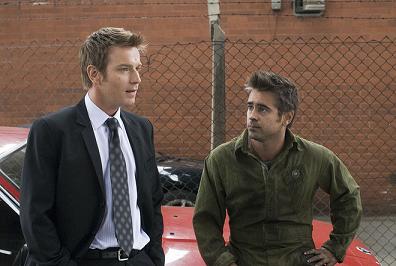Cassandra’s Dream
Ewan McGregor, Colin Farrell, and Tom Wikinson star in a film written and directed by Woody Allen.

In his 2004 film Melinda and Melinda (which opened that year’s Santa Barbara International Film Festival, for the record), Woody Allen flirted with the idea of telling his story in parallel comedy and tragedy. It was a nice idea, even if the film fumbled its premise, and the underlying message had mostly to do with Allen’s twin instincts. (His films generally keep to either comic or tragic mode, the twain rarely meeting.)
For this year’s model, the likeable and smartly-made Cassandra’s Dream, Allen is back in London – and back to the clearly non-comic, operatic side of his creative voice. Laughs are not invited to this party: it’s more a tautly-structured parable full of observations on morality, fate, degrees of transgression, and the hobgoblins of memory. Two brothers in London (Ewan McGregor and a surprisingly good Colin Ferrell, all pallor and stubble) struggle with dreams of rising up out of their humble station, and through a fabled, wealthy uncle (Tom Wilkinson), are ushered into a vastly thicker plot.
At this point, Allen’s biggest challenge is rising to comparisons to his own best work. By that barometer, Cassandra’s Dream pales in contrast with other Allen films of its ilk, including his masterful tragedies, Crimes and Misdemeanors and Match Point. In all these films, the chilling prospect of murder creeps into otherwise normal lives, an obsessive leitmotif in Allen’s “dark” movies. In this film, the brothers’ misdemeanors – and lust for escape from their circumstances – pave the way for grander crimes, but not without recriminations.
Breaking the tradition of spicing his films with vintage music, and lately more classic operatic fare, this film is scored by Philip Glass, unfortunately. Although Glass’ mechanical music often works well in film contexts, here it seems all wrong; like a cartoon facsimile of classical music. What remains classical, though, is Allen’s storytelling, colored by references to Greek tragedies and Shakespearean notions of destiny and self-justifying malevolence, with obvious nods to Hitchcock. “Cassandra’s Dream” is the name of a boat the brothers buy in the film’s opening sequence, and that vessel becomes both metaphorical and a clever narrative framing device in Allen’s story, which takes its place in the “pretty good” files of the Allen pile. Of course, compared to most of what passes for American cinema, a “pretty good” Allen film is still worth twice the price of admission.



